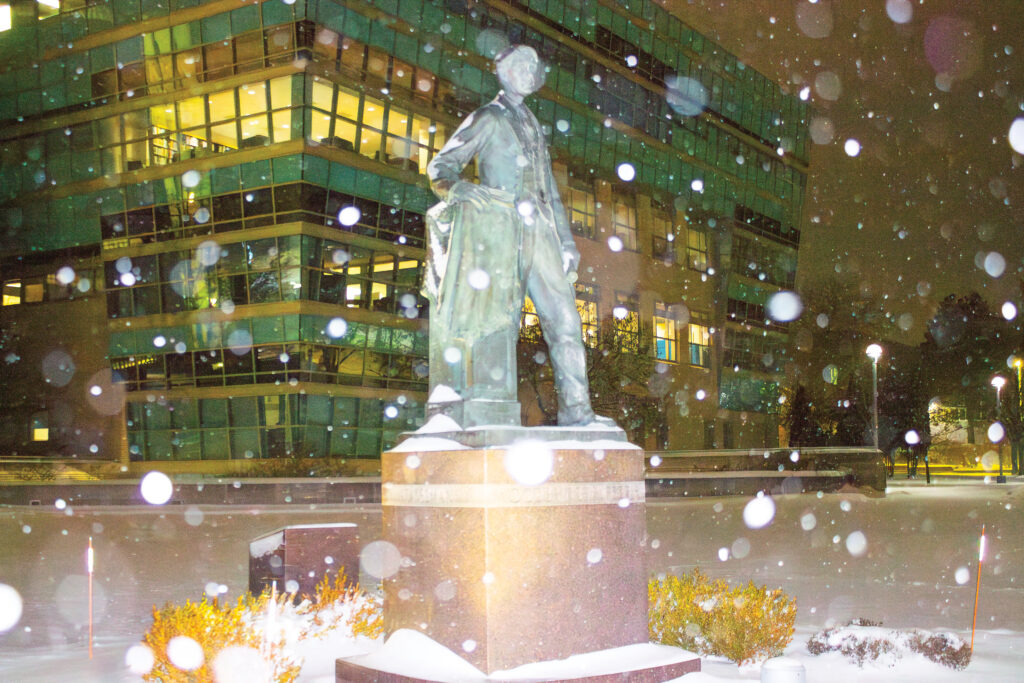Climate change affects everyone worldwide, and Michigan weather is no exception. Big Rapids weather has seen shifts from snowfall to warmth and rain throughout December and January.
Michigan has its fair share of weather phenomena, with Big Rapids receiving temperatures ranging in the 20s to lower 30s for the upcoming week. But what is the reason behind all of these weather changes? Why is Michigan different?

Physical geography professor Dr. Jennifer Johnson specializes in weather and climate studies. She explained Michigan’s climate change is due to the neighboring Great Lakes.
“The lakes play a key role in moderating temperature in the state of Michigan, and they also impact precipitation by adding water vapor to passing storms and producing lake effect snowfall. Water has a huge capacity to store heat, and as the air has warmed over the last 70 years, so have the lakes,” Johnson said. “The bigger the contrast in temperature between the cold air and the lake water temperature, the better this lake-effect mechanism works. So, if the lake is two degrees warmer than usual, it’s not warm enough for it to suddenly feel like it’s not winter, but those extra two degrees make a huge difference in how much water vapor the air can pick up as it crosses the lake, allowing more snow to be produced.”
Lake-effect snow is created when cold, dry air masses pass over comparatively warm lake water, which the lake warms up. Because warmer air can hold more water vapor, lakes can add moisture to these warm air masses through evaporation.
As the air continues downwind of the lake, it produces clouds and lake-effect snow with new heat and moisture it acquired over the lake. An increase in heat resulting from climate change can have a lasting impact on the weather, environment and people overall.
“As humans and the social, economic, agricultural and environmental systems we rely on adapt to climate change, there will be very few areas of life that aren’t impacted in some way by the repercussions. Regardless of how one feels personally about the topic or chooses to respond to the well-established peer-reviewed science, we are likely to be impacted in a variety of ways,” Johnson said. “There is literally no individual or profession that exists that isn’t impacted by weather.” Climate change is on students’ minds as an important environmental topic.
Digital animation and game design junior Alex Demeniuk gave his thoughts about climate change.
“I feel like it’s a major problem for the world that doesn’t get enough attention,” Demeniuk said. “Nobody seems to really talk about it in any major political platform, it’s always avoided, lazily glazed over like it doesn’t matter or derailed in favor of a completely different point. And if they have, I just haven’t seen it.”
Regardless of personal views or how someone responds to scientific research, everyone is impacted by climate change in a multitude of ways. Climate change is not something that can be completely overlooked.
Environmental biology junior Elizabeth Shinn weighed in her thoughts. “Well, I know it’s there. I’m not happy about it, but I can’t convince other people to change. I know I can help by at least being conscious about it. I’m not very educated on the subject, but I feel like even just awareness of it could help,” Shinn said. “I know that humans can adapt to it relatively okay, but the animals are taking the largest hit. In one of my classes, it was mentioned that we are entering a mass extinction which worries me.”
Climate change is affecting people in every area of the world.
The city of Los Angeles is experiencing this right now, wildfires are spreading throughout the city and have taken over 25 lives and destroyed over 150,000 acres of land in the region.
While wildfires in California are not uncommon, they have gone up in numbers over recent years due to extended dry seasons and rising average temperatures.
This includes things like using reusable bags for groceries, reducing carbon footprint by walking or biking, eating more fruits and vegetables and reducing air pollution caused by the combustion of fossil fuels resulting in cleaner air. Reducing the effects of climate change will not only benefit our environment, but it will also benefit our health.
If you are a student interested in combatting climate change, The University Sustainability Committee Ferris website offers ways students could do their part to create a more sustainable campus environment.
